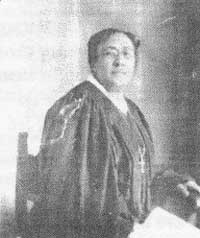By Robert A. Hageman
Reverend Dr. Florence Spearing Randolph, pastor of Wallace Chapel A.M.E. Zion Church in Summit, New Jersey from 1925 -1946 was also a leader of the women's suffrage movement in New Jersey. She was recently included in an exhibit at the Morris County Historical Society. Her involvement in American religion, society and politics in the first half of the 20th century place her among the elite women in New Jersey and local Summit history.
Florence Spearing was born to one of the old free African-American families in Charleston, South Carolina on August 6, 1866. Her father was a prosperous cabinetmaker and she attended local public schools graduating from Charleston's Avery Normal Institute. With employment options limited for black women, Florence chose dressmaking and was apprenticed.
In 1885 on a trip to Jersey City to visit her older sisters, Florence saw that her dressmaking skills were in demand and at a higher price. She decided to move north to Jersey City. The following year she married Hugh Randolph, a cook in the dining car service of Pullman Company. Soon she set up her own dressmaking business in their Jersey City home. The couple had one child. Her husband died in 1913.
At an early age, while living with her family in Charleston, Florence was active in the Methodist Episcopal Church. In Jersey City she became affiliated with the African Methodist Episcopal Zion (AMEZ) church as a Sunday school teacher and youth class leader. (The AMEZ was founded in New York City as an outgrowth of the dissatisfaction of the blacks over discrimination in the John Street Methodist Church).
Her early interest in public service began about the same time and in 1892 she was invited to join the Women's Christian Temperance Union (WCTU). This tie led to lecturing engagements and the foundation of an organization involved in city missionary work. Her Christian and community service efforts came together in 1897 when Florence sought a license to preach. It was granted, although with some opposition from older male representatives of the AMEZ. In 1900 she was ordained a deacon and three years later an elder.
At the 1900 church conference in Atlantic City, Randolph was appointed a delegate to the 1901 Third Methodist Ecumenical Conference in London. Upon returning, she was chosen to pastor her first of five churches in New Jersey and New York. They were generally poor, small, in debt and in need of leadership, spiritual and financial. In her first 12 years she worked without salary.
Florence also focused on several interest groups during the years 1912-1920. She organized the New Jersey State Federation of Colored Women's Clubs (NJFCWC) in 1915, was a member of the Executive Committee of New Jersey's Suffrage Association, and was President of the Missionary Society of New Jersey.
During 1922-1924 Randolph traveled throughout Liberia and the Gold Coast preaching and gaining knowledge of the AMEZ foreign mission, particularly the educational, health and service needs in Africa. When she returned home she brought with her an African girl -Charity Zumala- who was educated at Summit High School graduating with honors.
By 1925 the relationship between Randolph and the church to which she was most often associated began when she was appointed "temporary" pastor of the small (35 members) mission church in Summit, N.J. known as Wallace Chapel African Methodist Episcopal Zion Church It met at the local YMCA. Florence's first sermon was given on May 17,1925. Three years later Randolph and the trustees purchased a duplex home at Orchard and Broad Streets in Summit providing for a 100 seat chapel on the lower floor and a parsonage upstairs.
As the membership at Wallace Chapel increased, so did its finances and in 1936 construction began on the same site for a new sanctuary, parsonage and community center. It was completed in 1937 and remains the church today.
Randolph's work in Christian and interracial organizations and community service led to her active involvement in the equal rights movement. Her organization of the previously mentioned NJFCWC in 1915 resulted in a close working relationship with the suffragists and eventually the ratification of the 19th Amendment in 1920.
As an influential Executive Committee member of the New Jersey Women's Sufirage Association, Florence was invited by the chair (former Governor Edward C. Stokes) of the New Jersey Republican Party to assist in Warren G. Harding's presidential campaign in 1920.
In 1933 Randolph was awarded an honorary doctor of divinity degree from Livingstone College in North Carolina. She was the first woman to receive such an honor from the college.
After twenty-one years as pastor of Wallace Chapel, Reverend Randolph retired from active ministry in 1946. The church, the community center, and the parsonage were all free of debt.
Five years later, on December 28,195l, at the age of 85, Rev. Florence Spearing Randolph, D.D. died. She was often asked the secret of her success. Her reply? "Christ is all in all."

